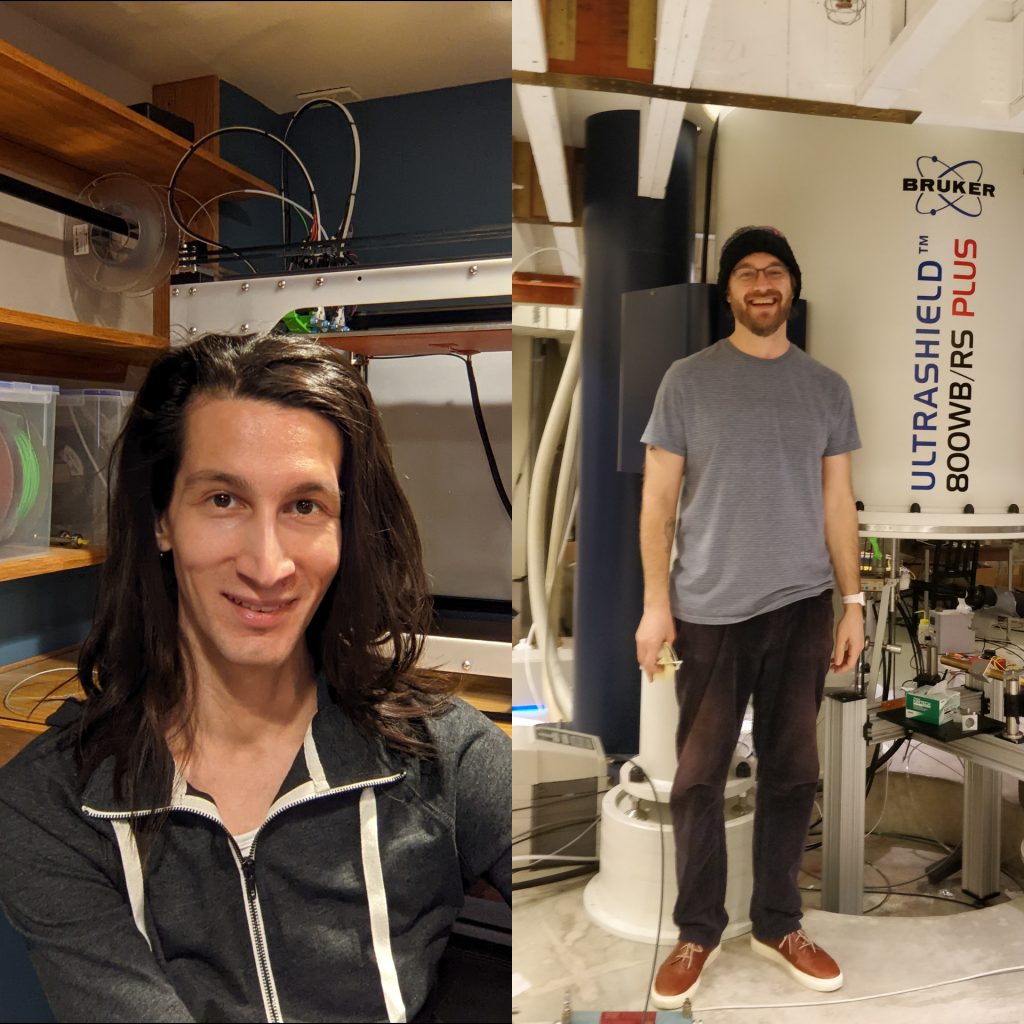Podcast: Play in new window | Download
Subscribe: Apple Podcasts | RSS

Joshua Vasquez of The Allen Institute and the Jubilee Project and Zach Fredin of Commonwealth Fusion Systems
Welcome Joshua Vasquez of The Allen Institute and the Jubilee Project and Zach Fredin of Commonwealth Fusion Systems!
- Background
- This is a special show because I (Chris) found a 2019 recording during Teardown (other shows were released from that event). Somehow the show with Joshua and Zach was never published, I think because I found it on my recorder much later.
- The 2019 show (starting at 1:31:00 on the recording) was when Joshua had been in grad school at the University of Washington for 1 year and Zach was getting ready to go to grad school at MIT at the Center for Bits and Atoms (CBA). Both were intending to get their PhD.
- I caught up with Joshua and Zach at the 2022 Hackaday Superconference in early November (discussed on 610) and learned that they had both left their PhD program with a Master’s Degree and now were back in industry, working at some very cool new jobs.
- I thought it would be an interesting experiment to record with them again in 2022 and get their perspectives on grad school…but I didn’t let them hear the 2019 show first.
- The Jubilee Project is a toolchanger on a CNC machine / gantry.
- Zach had been on the show before for Neurotinker
- Zach worked on Reconfigurable computation systems
- NMR
- Joshua joined University of Washington to work with past guest Nadya Peek
- “Fabricatability”
- Kinematic coupling, which is a method of exact constraint
- It’s like “Free body diagrams but in reverse”
- Bal-tec precision balls
- Joshua contacted a seller on alibaba and has an 8 mm ball with M3 threaded hole made for other people wanting to build a Jubilee
- Hackaday vocabulary of parts
- Misumi
- Jubilee project long term? Still going, some people building the project still. Filistruder makes a kit based on it.
- Jubilee Discord community
- The community is working on some specialized heads, like a sonicator head
- Zach was working on nuclear magnetic resonance, trying to make containers that could withstand 7 million rpm / 112 kHz.
- Using the machine they were able to get the molecular spectrum (like mass spectrometry) of things like brain plaque for Alzheimers research.
- PI = Principal Investigator
- Work is continuing on the microadjusters and making diamond tubes
- What are the downsides of grad school?
- Getting to work on the things you want to work on
- Balancing Research and Development
- Prior to grad school, Joshua was at a synthetic biology company. He was “the human who would write software for hardware” and building machines for their manufacturing capabilities.
- E3D toolchanger
- Was drudgery part of the process?
- Zach gives cautionary advice for grad students: “Early on you need to learn how to evaluate rabbit holes” (note this advice when listening to the 2019 section)
- Tidal forces
- How to make almost anything
- Joshua says that in grad school, “the projecting part of you becomes weaponized. [It was] was near and dear to who I was”
- A lot of work before grad school was trade secret
- Joshua’s current work is open source, which is an unexpected benefit.
- He works at the Allen institute (named for Microsoft co-founder Paul Allen), in the recently formed “Institute for Neural Dynamics“.
- They are imaging mouse brains to understand what are the ingredients inside the brain.
- They already know a lot of the genes in neurons, but now they’re finding out where those genes are expressed.
- The project he’s working on is like a “reverse SLA printer”.
- It’s a rolling shutter camera with a laser sheet slicing across a mouse brain that is “transparent” (with some bio chemical voodoo)
- 1 mouse brain = 100 TB of data
- Zach is now working on Commonwealth Fusion Systems, a 400 person startup for fusion energy.
- They are busy trying to get deuterium and tritium to fuse
- ITER is a long running fusion project in France, built using the magnetics available at the time.
- CFS is using higher temp superconductors, which represent better magnetics. Magnetics and plasma containment are one of the key constraints for “power in vs power out”
- Zach does instrumentation for the machine as a “Tokamak Instrumentation Engineer”
- The platform CFS hopes to commercialize is called “ARC”
- Zach is getting back to making by joining the recently relaunced Artisans Asylum
- Joshua felt bona fides (masters degree from UW) helped in the interview for his current job (which he found out about at the Seattle Hardware Happy Hour!), but he didn’t need to have the knowledege gained at grad school to understand the work.
- The 2019 portion of in the show starts around 1:31:00

Please link this in
Found it very interesting when it was mentioned in podcast.
https://hackaday.com/2019/09/11/books-you-should-read-exact-constraint-machine-design-using-kinematic-principles/
It’s the little blue book that’s mentioned.